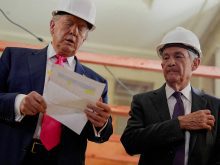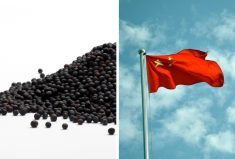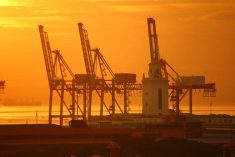After more than two decades trade liberalization seems out of style, but like fat lapels or skinny ties, it’s likely to be vogue again.
That’s because of the benefits, especially for farmers, says Joe Glauber, the United States Department of Agriculture’s former chief economist and senior research fellow at the International Food Policy Research Institute (IFPI) in Washington, D.C.
“There is no question that there are costs and you will find losers out of this, but overall benefits are good,” Glauber told reporters Oct. 21 in Winnipeg, after speaking to the Fields on Wheels grain transportation conference. “There are legitimate concerns on environmental and other sorts of issues that need to be taken into account, but I don’t think the culprit is trade per se, it is the rules on trade and those things can be negotiated.
Read Also

Trade uncertainty, tariffs weigh on Canadian beef sector as market access shifts
Manitoba’s beef cattle producers heard more about the growing uncertainty they face as U.S. tariffs, and shifting trade opportunities, reshape their market.
“I think there are a lot of consumer benefits that are taken for granted out of this. And that is probably true for producers too. You are only aware of trade when there is a problem.”
Most economists support trade liberalization, at least in theory, because resources are supposed to be allocated more efficiently reflecting each country’s competitive and comparative advantages resulting in lower prices for consumers. But for some, liberalized trade is just another word for “globalization,” which its critics claim benefits corporations and their shareholders at the expense of the poor and the environment.
- Read more: U.S. trade double standard confirmed
For years the U.S. has promoted trade liberalization, which is a natural extension of free enterprise and capitalism — the economic foundations of the United States. So it was strange indeed to have both presidential candidates — Hillary Clinton and Donald Trump — opposing it. But the populist view of trade liberalization is that it cost U.S. workers jobs, especially in the manufacturing sector. And it did.
“One of the failures in the U.S. is that we haven’t done much to address dislocation and other problems that happens with globalization and trade agreements,” Glauber said during his address, adding more needs to be done to assist trade losers during the transition.
“I’m disappointed probably more in the sense that I feel that we — economists and others — should be doing a better job of promoting this and why it is important,” he told reporters later. “You just don’t see anybody articulating why trade is important. You don’t see that much in the press.”
Of the two, Clinton is likely to be the least protectionist, Glauber said.
In the meantime, lame duck President Barack Obama will push to ratify the Trans-Pacific Partnership (TPP) before his term ends Jan. 20. While Glauber says ratification is possible, which he says would be good for American farmers, there are a lot of doubters.
Normally, elected Republicans would support TPP — a deal reached by Brunei, Chile, New Zealand, Singapore, Australia, Canada, Japan, Malaysia, Mexico, Peru, the United States, and Vietnam — but many are spooked by the domestic opposition.
If the U.S. doesn’t ratify, Japan could use it as an opportunity to pull out. That’s all the more reason the U.S. should sign on, Glauber said.
It’s less likely the U.S. will pull out of already signed trade deals, including the North American Free Trade Deal (NAFTA), he said. Trump promised to do just that.
Ending NAFTA would be a blow to Canada given the U.S. is its biggest trading partner. And the reverse was true until last year, when China overtook Canada.
“There certainly would be a steady stream of people that would be coming in the door, not just exporters, but importers who have critical need of certain ingredients and other sorts of things,” Glauber said.
“I find it hard to believe that there would be actually a reneging or going back on agreements that have been negotiated.”
There’s also debate around whether a president has the power alone to kill the deal.
The push for trade liberalization ebbs and flows, Glauber told reporters. In the 19th century Britain repealed its protectionist Corn Laws, triggering increased international grain trading. But in 1930 the United States passed the Smoot–Hawley Tariff Act, increasing tariffs on 20,000 imported goods to record levels and according to some economists, worsening the worldwide Depression.
Following the Second World War trade liberalism began anew, based partly on the premise that increased trade would lead to fewer wars. The multilateral General Agreement on Tariffs and Trade (GATT) that began in 1948 morphed into the World Trade Organization (WTO) in 1995.
The Uruguay Round under GATT reined in export farm subsidies and led to the decoupling of domestic farm supports from farm production. However, the Doha Round, which began in 2001 and was aimed at increasing market access and helping developing countries, fell apart (see sidebar).
The lapse in multilateral trade agreements gave rise to regional ones, including TPP. They have the potential to help or hinder multilateralism, Glauber said. Countries willing to meet terms of a regional agreement should be able to join, he said. Such efforts could eventually be absorbed under the WTO.
“My fear is if you end up with these (regional) trade agreements that are sort of trading blocks with no real interest in expansion, then I think you really do not just undermine, you take all of the oxygen out of the WTO in terms of the negotiations,” Glauber said.
“The WTO is also a mechanism to continue the reform process and to move people down the road toward a more liberalized world and I am fearful that potentially mega regionals stop that.”
Trade will continue to grow, Glauber said.
“I think trade is going to be more and more important getting products from areas that are surplus, like North America and South America, to areas where demand is growing like North Africa,” Glauber said.
“I think it is going to take a little effort on the part of think-tanks like IFPI and others to make that case again. Maybe it was assumed everyone knew it and seems to have forgotten it, but I think it is important for the U.S. to take a leadership role in this process.
“Clearly in an economy as big as ours it is important to be a leader in this regard.”
















